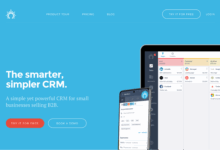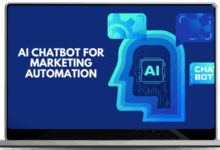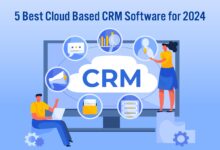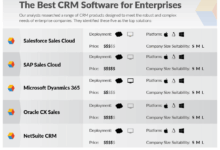AI-Powered CRM Software: Revolutionizing Customer Relations
AI-Powered CRM Software is transforming how businesses manage customer relationships. This technology leverages artificial intelligence to automate tasks, analyze data, and provide valuable insights, ultimately boosting efficiency and improving customer experiences. We’ll explore the core functionalities, benefits, challenges, and future trends of this innovative software, showcasing its impact across diverse industries.
From predictive analytics that anticipate customer needs to natural language processing that streamlines communication, AI-powered CRM systems offer a powerful blend of automation and intelligent analysis. This allows businesses to personalize interactions, optimize sales processes, and provide superior customer support, leading to increased customer satisfaction and improved bottom lines. This exploration will delve into the specifics of these capabilities and their practical applications.
Defining AI-Powered CRM Software
AI-powered CRM software represents a significant advancement in customer relationship management, leveraging artificial intelligence to automate tasks, analyze data, and provide actionable insights that traditional CRM systems cannot. This results in improved efficiency, enhanced customer engagement, and ultimately, increased profitability for businesses of all sizes.
AI-powered CRM software goes beyond the basic functionalities of traditional CRM systems by incorporating machine learning algorithms and other AI technologies to perform complex tasks and predictions. This allows businesses to gain a deeper understanding of their customers, personalize interactions, and make data-driven decisions that optimize sales and marketing efforts.
Core Functionalities of AI-Powered CRM Software
AI-powered CRM systems offer a range of core functionalities designed to streamline operations and enhance customer interactions. These include automated lead scoring and qualification, predictive analytics for forecasting sales and identifying at-risk customers, personalized recommendations and targeted marketing campaigns, and intelligent chatbots for immediate customer support. Furthermore, these systems often incorporate advanced reporting and analytics dashboards, providing a comprehensive view of customer interactions and business performance. These functionalities are significantly enhanced by the integration of AI, leading to more accurate predictions and more efficient processes.
Key Differences Between Traditional and AI-Powered CRM Systems
The primary difference lies in the use of artificial intelligence. Traditional CRM systems primarily focus on data storage, retrieval, and basic reporting. While they can help organize customer information and track interactions, they lack the predictive and analytical capabilities of AI-powered systems. AI-powered CRMs automate tasks, personalize interactions, and offer predictive insights that help businesses proactively address customer needs and optimize their strategies. For example, a traditional CRM might track customer interactions, while an AI-powered CRM would predict which customers are most likely to churn and suggest proactive interventions to retain them.
Examples of AI Features Integrated into CRM Software
Several AI features significantly enhance the capabilities of CRM software. Predictive analytics uses historical data to forecast future trends, such as sales revenue or customer churn. Natural Language Processing (NLP) enables the system to understand and respond to customer communications in natural language, facilitating automated responses and improved customer service through chatbots and sentiment analysis. Machine learning algorithms continuously improve the accuracy of predictions and personalize customer experiences by learning from past interactions and data patterns. For example, an AI-powered CRM might use NLP to analyze customer feedback from surveys and social media to understand sentiment and identify areas for improvement.
Comparison of Leading AI-Powered CRM Solutions
| Feature | Salesforce Einstein | Microsoft Dynamics 365 AI | HubSpot CRM with AI features |
|---|---|---|---|
| Predictive Analytics | Strong; offers lead scoring, opportunity insights, and churn prediction | Strong; provides sales forecasting, opportunity scoring, and customer insights | Good; provides lead scoring and basic predictive capabilities |
| Natural Language Processing | Integrated; enables intelligent search and automated responses | Integrated; powers chatbots and sentiment analysis | Growing; increasingly incorporating NLP into various features |
| Machine Learning | Advanced; continuously learns and improves predictions | Advanced; uses machine learning for various tasks, including sales forecasting | Developing; utilizes machine learning for lead scoring and other functions |
| Integration Capabilities | Excellent; integrates with a wide range of applications | Excellent; integrates well with other Microsoft products and third-party apps | Good; offers integrations with various marketing and sales tools |
| Pricing | Varied; depends on the features and number of users | Varied; depends on the features and number of users | Offers a freemium model with paid options for advanced features |
Benefits of Implementing AI-Powered CRM Software
AI is revolutionizing customer relationship management, offering businesses unprecedented opportunities to enhance efficiency, personalize interactions, and ultimately, boost profitability. By automating repetitive tasks, providing insightful data analysis, and facilitating proactive engagement, AI-powered CRM systems are transforming how companies interact with their customers.
AI significantly impacts customer relationship management by streamlining processes, improving decision-making, and fostering stronger customer relationships. This leads to increased customer satisfaction, improved operational efficiency, and a stronger competitive advantage in today’s dynamic marketplace.
Improved Sales Efficiency and Lead Generation
AI-powered CRM systems drastically improve sales efficiency and lead generation through several key mechanisms. Predictive analytics, for example, can identify high-potential leads based on historical data and behavioral patterns, allowing sales teams to prioritize their efforts and focus on the most promising opportunities. Automated lead scoring and routing ensure that leads are directed to the most appropriate sales representatives, reducing response times and improving conversion rates. Furthermore, AI-driven chatbots can handle initial customer inquiries, qualifying leads and freeing up sales representatives to focus on closing deals. For instance, a company using AI to identify high-value leads saw a 25% increase in sales conversion rates within six months.
Enhanced Customer Service and Support
AI enhances customer service and support by providing faster, more personalized, and more efficient interactions. AI-powered chatbots can instantly answer frequently asked questions, resolve simple issues, and escalate complex problems to human agents. This reduces wait times, improves customer satisfaction, and frees up human agents to handle more complex issues. Sentiment analysis tools can monitor customer feedback across various channels, identifying potential problems and areas for improvement. For example, an airline using AI-powered chatbots reported a 30% reduction in customer service call volume and a significant improvement in customer satisfaction scores.
Return on Investment (ROI) Improvements
The return on investment (ROI) from implementing AI-powered CRM software can be substantial. By automating tasks, improving sales efficiency, and enhancing customer service, AI can lead to significant cost savings and revenue increases. Improved lead conversion rates, reduced customer churn, and increased customer lifetime value all contribute to a positive ROI. While precise ROI figures vary depending on the specific implementation and business context, studies suggest that companies using AI-powered CRM systems often see a significant return on their investment within a year or two. For example, a retail company reported a 15% increase in revenue and a 10% reduction in customer service costs after implementing an AI-powered CRM system. A key factor in maximizing ROI is careful planning and selection of the appropriate AI features tailored to specific business needs.
AI Features and Their Applications
AI-powered CRM systems leverage several key artificial intelligence features to significantly enhance customer relationship management. These features move beyond basic data storage and retrieval, providing predictive capabilities, automating tasks, and personalizing customer interactions to a degree previously unimaginable. The integration of these AI functionalities results in a more efficient, insightful, and ultimately more profitable CRM strategy.
Machine Learning in Predictive Modeling
Machine learning algorithms analyze historical CRM data—customer interactions, purchase history, demographics, and more—to identify patterns and predict future behaviors. This predictive modeling allows businesses to anticipate customer needs, personalize marketing campaigns, and proactively address potential issues. For example, a CRM system might predict which customers are at risk of churning based on their recent activity and engagement levels, allowing the company to implement targeted retention strategies. This proactive approach is far more effective than reacting to churn after it has already occurred. The accuracy of these predictions improves over time as the system learns from new data, constantly refining its models. A well-trained model can significantly improve sales forecasting, allowing for better resource allocation and inventory management.
Natural Language Processing (NLP) and Improved Customer Interaction
Natural Language Processing (NLP) enables CRM systems to understand and respond to human language. This functionality empowers chatbots to provide instant customer support, analyze customer feedback from surveys and emails, and personalize communication based on individual preferences. For instance, NLP can analyze customer reviews to identify recurring themes of satisfaction or dissatisfaction, allowing businesses to make data-driven improvements to their products or services. Furthermore, NLP can automate the categorization and routing of incoming customer inquiries, ensuring faster response times and improved customer satisfaction. This technology also enables sentiment analysis, providing valuable insights into customer opinions and allowing for more effective engagement strategies.
AI-Driven Automation and Streamlined CRM Processes
AI-driven automation streamlines various CRM processes, freeing up human resources for more strategic tasks. This includes automating repetitive tasks such as data entry, lead qualification, and appointment scheduling. For example, AI can automatically qualify leads based on predefined criteria, ensuring that sales representatives focus their efforts on the most promising prospects. Automated email campaigns can be personalized based on customer behavior, leading to higher conversion rates. Furthermore, AI can identify and flag potential issues, such as overdue payments or missed deadlines, allowing for proactive intervention and preventing costly delays. This automation significantly increases efficiency and reduces operational costs.
AI Features and Business Benefits
The integration of AI into CRM systems offers numerous business benefits. Below is a list illustrating the connection between specific AI features and their resulting advantages.
| AI Feature | Business Benefit | Example |
|---|---|---|
| Predictive Lead Scoring | Improved sales conversion rates | Prioritizing high-potential leads for sales representatives. |
| Customer Segmentation | Personalized marketing campaigns | Tailoring marketing messages to specific customer groups based on their preferences and behavior. |
| Churn Prediction | Proactive customer retention | Identifying at-risk customers and implementing retention strategies before they churn. |
| Automated Customer Support | Reduced operational costs and improved customer satisfaction | Implementing AI-powered chatbots to handle routine customer inquiries. |
| Sales Forecasting | Improved resource allocation and inventory management | Accurately predicting future sales to optimize resource allocation and inventory levels. |
Challenges and Considerations
Implementing AI-powered CRM software offers significant advantages, but it’s crucial to acknowledge and proactively address potential challenges to ensure a successful deployment and maximize return on investment. Failing to consider these factors can lead to project delays, budget overruns, and ultimately, a system that fails to meet expectations.
Data Privacy and Security Concerns
The use of AI in CRM involves processing vast amounts of sensitive customer data, raising significant privacy and security concerns. AI algorithms require access to this data to learn and improve, making robust security measures paramount. Data breaches can result in significant financial losses, reputational damage, and legal penalties. Compliance with regulations like GDPR and CCPA is mandatory, necessitating the implementation of strong data encryption, access control mechanisms, and regular security audits. Furthermore, organizations must establish clear data governance policies outlining data usage, retention, and disposal procedures, ensuring transparency and accountability. Failure to adequately address these concerns can lead to significant legal and financial repercussions.
Data Quality Implications
The effectiveness of AI-powered CRM systems is heavily reliant on the quality of the data they are trained on. Inaccurate, incomplete, or inconsistent data will lead to flawed predictions, poor customer segmentation, and ultimately, ineffective marketing and sales strategies. Garbage in, garbage out, as the saying goes. Data cleansing and validation processes are essential to ensure data accuracy and reliability. This involves identifying and correcting errors, removing duplicates, and standardizing data formats. Regular data quality checks and ongoing monitoring are crucial to maintain data integrity and ensure the long-term effectiveness of the AI system. For example, inaccurate customer contact information can lead to failed marketing campaigns and lost sales opportunities.
Integration Challenges with Existing Systems
Integrating AI-powered CRM software with existing systems can present significant technical challenges. Compatibility issues between different software platforms and databases can hinder seamless data flow and functionality. Data migration from legacy systems can be complex and time-consuming, requiring careful planning and execution. Moreover, the need to adapt existing workflows and processes to accommodate the new AI-powered system can disrupt business operations and impact employee productivity. A phased approach to integration, coupled with thorough testing and user training, can mitigate these challenges and ensure a smooth transition. For instance, a company might start by integrating the AI CRM with its sales team’s workflow before expanding to marketing and customer service. Effective project management and clear communication are crucial for successful integration.
Implementation Challenges
Successfully implementing AI-powered CRM requires more than just purchasing the software. It necessitates a comprehensive strategy that encompasses various aspects, including careful planning, robust data management, appropriate training for employees, and ongoing monitoring and optimization. Resistance to change from employees unfamiliar with AI-driven tools can hinder adoption. Furthermore, the need for specialized skills to manage and maintain the system can pose a challenge, requiring investment in training or hiring specialized personnel. Finally, the cost of implementation, including software licensing, data migration, training, and ongoing maintenance, can be substantial, requiring careful budgeting and resource allocation. A successful implementation requires a holistic approach that considers all these aspects.
Future Trends in AI-Powered CRM
The landscape of AI-powered CRM is constantly evolving, driven by advancements in machine learning, natural language processing, and big data analytics. These advancements are not only enhancing existing CRM functionalities but also paving the way for entirely new approaches to customer relationship management. We can expect significant shifts in how businesses interact with their customers and manage their data in the coming years.
The integration of increasingly sophisticated AI capabilities will profoundly impact customer experience, leading to more personalized, proactive, and efficient interactions. This will necessitate a shift in business strategies, focusing on data-driven decision-making and the seamless integration of AI across all customer touchpoints.
Predictive Analytics and Proactive Customer Engagement
Predictive analytics, powered by machine learning algorithms, will become even more central to AI-powered CRM. This will enable businesses to anticipate customer needs and proactively address potential issues before they escalate. For instance, an AI-powered CRM might predict customer churn based on usage patterns and engagement levels, allowing businesses to intervene with targeted retention strategies. This proactive approach contrasts sharply with the reactive approach of traditional CRM systems, leading to improved customer satisfaction and reduced churn rates. Companies like Netflix utilize predictive analytics to suggest shows and movies, enhancing user experience and engagement.
Hyper-Personalization and Customer Journey Optimization
AI will enable hyper-personalization at an unprecedented scale. CRM systems will leverage customer data to tailor marketing messages, product recommendations, and even customer service interactions to individual preferences and behaviors. This goes beyond simple segmentation; AI can dynamically adjust the customer experience in real-time based on individual actions and interactions. For example, an e-commerce platform could use AI to personalize product recommendations based on browsing history, purchase history, and even real-time location data.
Enhanced Customer Service through Conversational AI
Conversational AI, including chatbots and virtual assistants, will play an increasingly significant role in customer service. These AI-powered tools will be able to handle a wider range of customer inquiries, providing instant support and resolving issues efficiently. Moreover, advancements in natural language processing will allow for more natural and human-like interactions, improving customer satisfaction. Companies such as Sephora are already leveraging chatbots to provide instant product recommendations and assistance, improving customer experience and reducing the workload on human agents.
The Evolution of AI in CRM: A Conceptual Model (Next 5 Years)
Imagine a visual representation of AI’s evolution in CRM over the next five years. Year 1 shows basic AI features like automated email responses and lead scoring. Year 2 demonstrates more advanced capabilities, such as predictive analytics for sales forecasting and personalized recommendations. Year 3 illustrates the integration of conversational AI for customer service. Year 4 showcases the emergence of hyper-personalization through real-time data analysis and dynamic customer journey optimization. Year 5 depicts a fully integrated, intelligent CRM system that anticipates customer needs, proactively addresses issues, and continuously learns and adapts to changing customer behavior. This system operates almost autonomously, minimizing human intervention while maximizing efficiency and customer satisfaction. This evolution reflects a gradual shift from reactive to proactive, and from generalized to hyper-personalized customer interactions.
Innovative Applications of AI in CRM
Personalized marketing campaigns, driven by AI, will become more sophisticated, utilizing detailed customer profiles and predictive modeling to target specific audiences with highly relevant messages. Proactive customer support, anticipating potential problems and offering solutions before customers even reach out, will be a key differentiator. For example, an AI-powered CRM might identify a customer at risk of churning and automatically offer a discount or special promotion to retain them. Another innovative application is the use of AI to analyze customer feedback and sentiment, providing valuable insights for product development and improvement. Companies like Amazon utilize this approach to continuously improve their products and services based on customer reviews and feedback.
Illustrative Examples
AI-powered CRM systems are transforming how businesses interact with their customers. The following examples demonstrate the practical application of AI across diverse sectors, highlighting the significant impact on efficiency, customer satisfaction, and ultimately, profitability. Each example focuses on specific AI features and their tangible results.
AI-Powered CRM in E-commerce: Personalized Shopping Experiences
E-commerce businesses leverage AI to create highly personalized shopping experiences, boosting customer engagement and sales. This personalization is achieved through a combination of AI features, leading to measurable improvements in key performance indicators.
- AI Feature: Predictive analytics identifies potential customer churn based on browsing history, purchase frequency, and engagement levels. This allows for proactive interventions, such as targeted discounts or personalized recommendations, to retain customers.
- AI Feature: Recommendation engines, powered by collaborative filtering and content-based filtering, suggest products tailored to individual customer preferences. This increases average order value and drives impulse purchases.
- Impact: A leading online retailer reported a 15% increase in customer retention and a 10% rise in average order value after implementing an AI-powered CRM system with these features. This translates directly into increased revenue and improved customer lifetime value.
AI-Powered CRM in Healthcare: Streamlined Patient Management
In the healthcare industry, AI-powered CRMs improve patient care and operational efficiency by automating tasks and providing valuable insights. This leads to better patient outcomes and reduced administrative burden.
- AI Feature: Natural Language Processing (NLP) analyzes patient notes and medical records to identify key information, automating administrative tasks like appointment scheduling and follow-up reminders. This frees up staff time for direct patient care.
- AI Feature: Predictive modeling identifies patients at high risk of readmission or developing specific health complications, enabling proactive interventions and preventative care. This improves patient outcomes and reduces healthcare costs.
- Impact: A large hospital system saw a 20% reduction in hospital readmissions and a 10% decrease in administrative costs after implementing an AI-powered CRM system. This demonstrates the significant potential for improved patient care and cost savings.
AI-Powered CRM in Finance: Enhanced Customer Service and Fraud Detection
Financial institutions utilize AI-powered CRMs to improve customer service, detect fraudulent activities, and personalize financial advice. The application of AI in this sector significantly enhances security and customer satisfaction.
- AI Feature: Chatbots provide instant customer support, answering frequently asked questions and resolving simple issues 24/7. This improves customer satisfaction and reduces the workload on human agents.
- AI Feature: Machine learning algorithms analyze transaction data to identify suspicious patterns and flag potential fraudulent activities in real-time. This enhances security and minimizes financial losses.
- Impact: A major bank reported a 15% reduction in fraudulent transactions and a 20% increase in customer satisfaction after implementing an AI-powered CRM system with these features. This illustrates the powerful combination of improved security and enhanced customer experience.
End of Discussion
In conclusion, AI-powered CRM software represents a significant advancement in customer relationship management. By harnessing the power of artificial intelligence, businesses can achieve unprecedented levels of efficiency, personalization, and customer satisfaction. While challenges related to data privacy and integration exist, the potential benefits far outweigh the risks, making the adoption of AI-powered CRM a strategic imperative for businesses seeking to thrive in today’s competitive landscape. The future of CRM is undeniably intelligent, promising even more innovative applications and transformative results.





